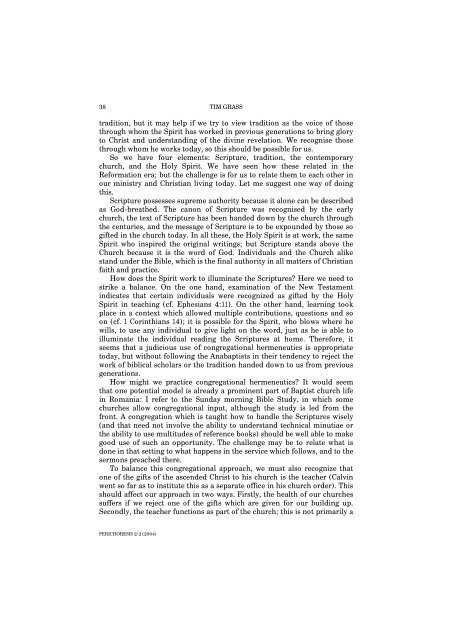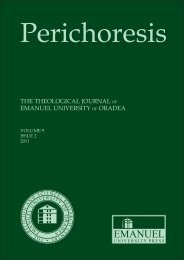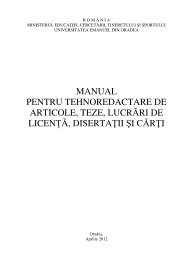Paradise Lost - Universitatea "Emanuel"
Paradise Lost - Universitatea "Emanuel"
Paradise Lost - Universitatea "Emanuel"
You also want an ePaper? Increase the reach of your titles
YUMPU automatically turns print PDFs into web optimized ePapers that Google loves.
38<br />
PERICHORESIS 2/2 (2004)<br />
TIM GRASS<br />
tradition, but it may help if we try to view tradition as the voice of those<br />
through whom the Spirit has worked in previous generations to bring glory<br />
to Christ and understanding of the divine revelation. We recognise those<br />
through whom he works today, so this should be possible for us.<br />
So we have four elements: Scripture, tradition, the contemporary<br />
church, and the Holy Spirit. We have seen how these related in the<br />
Reformation era; but the challenge is for us to relate them to each other in<br />
our ministry and Christian living today. Let me suggest one way of doing<br />
this.<br />
Scripture possesses supreme authority because it alone can be described<br />
as God-breathed. The canon of Scripture was recognised by the early<br />
church, the text of Scripture has been handed down by the church through<br />
the centuries, and the message of Scripture is to be expounded by those so<br />
gifted in the church today. In all these, the Holy Spirit is at work, the same<br />
Spirit who inspired the original writings; but Scripture stands above the<br />
Church because it is the word of God. Individuals and the Church alike<br />
stand under the Bible, which is the final authority in all matters of Christian<br />
faith and practice.<br />
How does the Spirit work to illuminate the Scriptures? Here we need to<br />
strike a balance. On the one hand, examination of the New Testament<br />
indicates that certain individuals were recognized as gifted by the Holy<br />
Spirit in teaching (cf. Ephesians 4:11). On the other hand, learning took<br />
place in a context which allowed multiple contributions, questions and so<br />
on (cf. 1 Corinthians 14); it is possible for the Spirit, who blows where he<br />
wills, to use any individual to give light on the word, just as he is able to<br />
illuminate the individual reading the Scriptures at home. Therefore, it<br />
seems that a judicious use of congregational hermeneutics is appropriate<br />
today, but without following the Anabaptists in their tendency to reject the<br />
work of biblical scholars or the tradition handed down to us from previous<br />
generations.<br />
How might we practice congregational hermeneutics? It would seem<br />
that one potential model is already a prominent part of Baptist church life<br />
in Romania: I refer to the Sunday morning Bible Study, in which some<br />
churches allow congregational input, although the study is led from the<br />
front. A congregation which is taught how to handle the Scriptures wisely<br />
(and that need not involve the ability to understand technical minutiae or<br />
the ability to use multitudes of reference books) should be well able to make<br />
good use of such an opportunity. The challenge may be to relate what is<br />
done in that setting to what happens in the service which follows, and to the<br />
sermons preached there.<br />
To balance this congregational approach, we must also recognize that<br />
one of the gifts of the ascended Christ to his church is the teacher (Calvin<br />
went so far as to institute this as a separate office in his church order). This<br />
should affect our approach in two ways. Firstly, the health of our churches<br />
suffers if we reject one of the gifts which are given for our building up.<br />
Secondly, the teacher functions as part of the church; this is not primarily a




